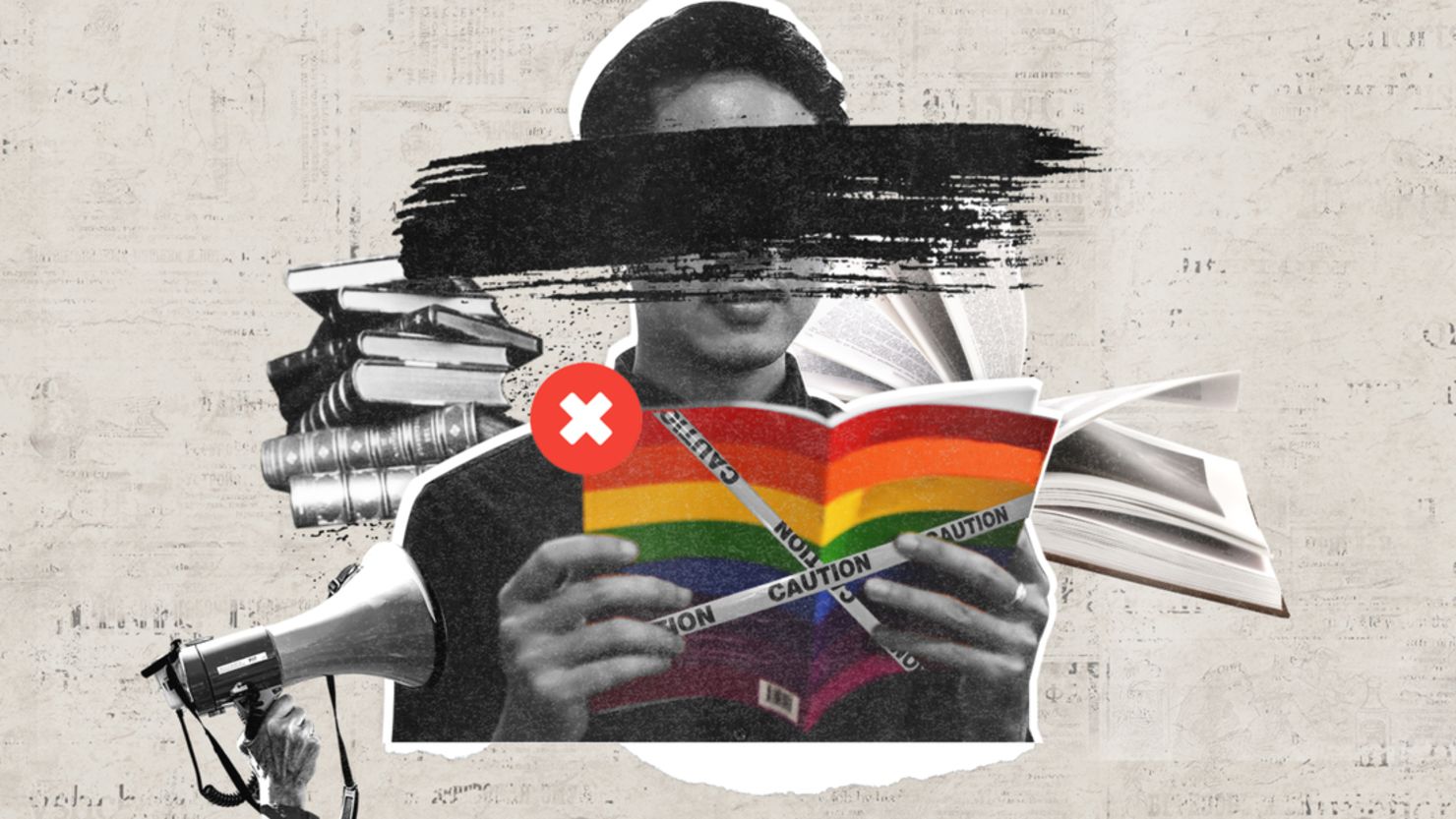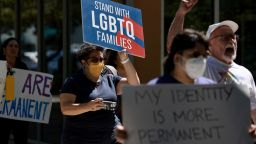Editor’s Note: This essay is part of the CNN Opinion series “America’s Future Starts Now,” in which people share how they have been affected by the biggest issues facing the nation and experts offer their proposed solutions. Martha Hickson is the recipient of the American Library Association’s 2022 Lemony Snicket Prize for Noble Librarians Faced With Adversity and the National Coalition Against Censorship’s Outstanding Librarian Award for her work defending the right to read. The opinions expressed in this commentary are her own. Read more opinion at CNN.
In September 2021, protesters ambushed the board meeting of the New Jersey school district where I have worked as a high school librarian since 2005. The protesters railed against “Gender Queer,” a memoir in graphic novel form by Maia Kobabe, and “Lawn Boy,” a coming-of-age novel by Jonathan Evison. They spewed selected sentences from the Evison book, while brandishing isolated images from Kobabe’s.
Next, they attacked Banned Books Week, an annual event celebrating the freedom to read. The protesters characterized it as a nefarious plot to lure kids to degradation.

But the real sucker punch came when one protester branded me a pedophile, pornographer and groomer of children. After a successful career, with retirement on the horizon, to be cast as a villain was heartbreaking.
Even worse was the response from my employer – crickets. The board sat in silence that night, and for the next five months refused to utter a word in my defense.
For months now, news broadcasts and social media have featured scenes of once-sedate board of education meetings now as action-packed as professional wrestling matches. Parents, faces red with wrath, scream in objection to library books. Often their outrage includes trash talk about librarians and board members.
America's Future Starts Now
These smackdowns aren’t isolated incidents. In a coordinated campaign, groups with extreme agendas have attacked libraries nationwide. Between January and August of this year, the American Library Association recorded 681 challenges against 1,651 books, setting a pace to shatter last year’s record 729 challenges.
For me, these aren’t just statistics, but the scorecard for the worst year of my working life.
The protesters eventually filed formal challenges against five books, all with LGBTQ+ themes, labeling them pornographic: “Gender Queer,” “Lawn Boy,” “All Boys Aren’t Blue” by George M. Johnson, “Fun Home” by Alison Bechdel and “This Book is Gay” by Juno Dawson.
Amid the controversy, some colleagues shunned me. Students who were allied with the protesters hid books about gender and sexuality. Hate mail arrived at my school email address, while trolls attacked me on social media. The protesters even attempted to file criminal charges with local law enforcement.
The library that served as a safe space for students now felt unsafe for me. Yet I continued to plug away, teaching information literacy classes, creating programs, and consulting with students until October of last year, when I experienced what I now know was a stress-induced collapse. When I saw my personal physician the next day, she ordered my removal from the workplace, prescribed anxiety medication and referred me to a therapist.
The first few weeks of therapy were difficult. Despair consumed me to the point that when the therapist asked, “Have you had thoughts about killing yourself?” I tearfully admitted that I went to bed nightly wishing that I wouldn’t wake up.
The suffering was not mine alone. Under normal conditions, our library provides a calming oasis for students. Beyond books and research resources, we offer relaxing activities and a soothing atmosphere that satisfies students’ social and emotional needs. While I was under attack, however, the library program languished. No new books, no displays, no craft projects, no research instruction, no librarian for a friendly chat.
Counselors later reported that students expressed fear for my welfare. Worst of all, LGBTQ+ students endured increased slurs, intimidation and even death threats from bullies emboldened by the behavior of intolerant parents.
Throughout the stand-off, book banners claimed, “It’s not a ban. The books are still available at the public library or Amazon.” But the kid with questions about gender or sexuality may not have transportation to the library and likely doesn’t have a credit card for online ordering. And for teens living in a home hostile to gender or sexual diversity, the school library may be the only safe space to explore these topics and develop the vocabulary for deeper conversations.
That’s why, when I returned to work, I remained determined as ever to save the books.
A reconsideration committee had begun meeting to evaluate each title. Hundreds of supportive community members, including dozens of students, had flocked to the October and November board meetings to take down the book banners. By January, the reconsideration committee had submitted its report to the board, which voted to retain all five books.
The four-month grudge match had cost the district thousands of dollars in meeting time and salaries by my estimate, distressed vulnerable students, ruptured professional ties, robbed me of my health and created a fissure within the community that has yet to heal. In fact, three of the protesters are now running for board seats, further dividing the community.
Although the board delivered a terse statement in February confirming that the claims against me were “unfounded,” relationships with administrators remain tense. My motivation has ebbed. I’m no longer willing to go above and beyond for an organization that wouldn’t provide basic protections for me.
In the broader context, though, I’m lucky. Colleagues around the country are grappling with far worse. Suzette Baker, a public librarian in Texas, says she lost her job after refusing her manager’s order to remove LGBTQ+ books. Amanda Jones, a Louisiana school librarian, filed a defamation suit to stop the online harassment leveled against her after she spoke out against censorship. And the Patmos Library in Jamestown Township, Michigan lost its tax funding over its inclusion of LGBTQ+ titles. It’s no wonder that authors’ advocacy group PEN America calls the current educational climate the “Ed Scare.”
The allusion to the McCarthy era’s Red Scare is apt. As then, the current censorship wave is accompanied by legislation designed to restrict access to information. In its recent “Educational Gag Orders” report, PEN America found that between January and September, 24 state legislatures introduced 54 restrictive bills, the majority of which “target discussions of race, racism, gender, and American history” in K-12 schools, public universities and workplaces.
Despite the nationwide sweep of censorship, a September EveryLibrary Institute survey found that the “overwhelming majority of voters strongly oppose book banning.”
To quell the intellectual insurrection, that mainstream majority must take a stand:
Get our free weekly newsletter
- Sign up for CNN Opinion’s newsletter.
- Join us on Twitter and Facebook
1. Join UniteAgainstBookBans.org, an anti-censorship coalition launched by the American Library Association.
2. Show up and speak up at board of education and public library board meetings.
3. Donate to organizations that defend the right to read.
4. Vote for candidates who oppose censorship, when board of education seats are on the ballot.
Sitting on the sidelines and sympathizing with lambasted librarians is not enough. Community members must take action to pin book banners to the mat. Otherwise, the First Amendment will be down for the count.






